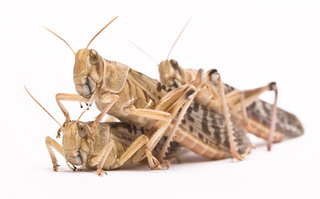02.11.2015
Insects – food of the future?
What seems disconcerting or revolting to us today may become a common dish on European plates some time in the future. The EU is increasingly dealing with the emerging significance of insects as food. This has less to do with the innovative power of our food industry, but rather indicates a matter-of-fact acknowledgement of the global realities of consumption and demand.
Consumption of insects and other anthropods, such as scorpions and spiders, has for centuries been part of every-day life for the majority of the world’s population. For an estimated 2 billion people, especially in Asia and the southern hemisphere, insects are a frequent part of the diet.
The United Nations Food and Agriculture  Organisation FAO has already published a comprehensive paper on edible insects. This paper points out that insects may contribute to food safety, a secure livelihood and environmental protection. A study carried out by Wageningen University in 2011 showed that mealworms produce 10 to 100 times less greenhouse gases per kilogramme of growth than pigs. Insects also metabolize their food into meat more directly, i.e. faster, than mammals.
Organisation FAO has already published a comprehensive paper on edible insects. This paper points out that insects may contribute to food safety, a secure livelihood and environmental protection. A study carried out by Wageningen University in 2011 showed that mealworms produce 10 to 100 times less greenhouse gases per kilogramme of growth than pigs. Insects also metabolize their food into meat more directly, i.e. faster, than mammals.
After three EU member states (Belgium, France, Netherlands) had prepared risk evaluations on insects as food or feed at the national level, the European Commission commissioned the EFSA with the preparation of a risk profile as well. It evaluates the microbiological risk potential based on scientific publications, the occurrence of prions, and the risk for the environment as comparable with that of other non-processed protein sources / animal production systems.
The potential problems discussed in the context of industrial insect production include unknown infections breeding populations may be affected by in restricted space and the use of pharmaceuticals this would involve. According to the EFSA, there is not sufficient data available on this nor on the question to what extent chemical pollutants from the substrate may adversely affect the insects.
The full report of EFSA can be found here.

